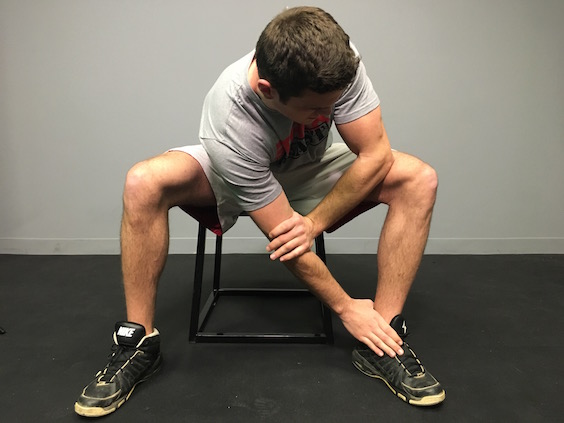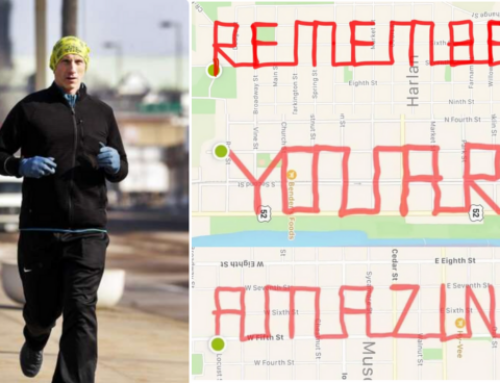The $31 Sleep Hack That Will Change Your Mornings Forever
Quality sleep is one of the most essential components of recovery.
And there’s a lot we can do before we go to bed to help us sleep better. We can read before bed instead of dousing our eyes with the blue light of a smartphone or iPad. We can keep our bedroom cooler than the rest of our house (the optimal temperature seems to be between 60-67 degrees Fahrenheit). We can take calcium and magnesium, or even drink tart cherry juice, which has been found to help combat insomnia. But amongst all these tactics, we overlook the fact that a key ingredient of getting a good night’s sleep actually starts first thing in the morning.
If you wake up feeling groggy, sluggish and out of sorts, it can set off a chain reaction that affects not only your entire day, but also the impending night’s sleep. If you can manage to wake up refreshed, you’ll put yourself in much better position to sleep longer and more deeply come bed time. Waking up right will also help you perform better from the moment you open your eyes.
This goes for athletes, lifters, businessmen—anybody who understands how a productive morning can impact PRs, athletic performance goals, and how you engage with the world. This is especially true for those of us who are naturally “afternoon” people and who don’t have a natural proclivity toward early waking, but are forced by society and circumstance to adapt, anyway.
As it relates to brain chemistry, when we sleep, we are deep into our melatonin production. Have you ever had someone or some thing shake you awake out of bed and your eyes dart around disoriented and confused like, “Where m I?” Or the alarm clock goes off and you are just too groggy to do anything but tap snooze and get back to dreaming? Or maybe you are the parent of a high school athlete and notice that no matter what you do you just can’t get that darned, “lazy” kid out of bed. Well that is all because the brain has not yet flipped the switch from melatonin secretion to serotonin secretion.
And it isn’t just about getting out of the melatonin pool, it’s also about Cortisol. Levels of this energy-mobilizing (and catabolic) hormone are at their highest just after waking, which helps us to begin our day. But when our morning routine is thrown off because of a groggy awakening and we end up skipping or rushing things such as hydration or a nutritious breakfast, these cortisol levels can remain elevated for too long. This sets up a potentially poor sleep come evening and can negatively impact any feats of strength and athleticism you were scheduled to perform that day.
What can we do to avoid this domino sequence of cause-and-effect with which we are all so familiar?
I believe one of the most valuable purchases you can make is a Dawn-Wake Simulator.
These devices allow you to set an alarm just as you would on any normal alarm clock. However, what happens prior to that wake time is quite different. As you snooze and your wake-up time draws near, a Dawn-Wake Simulator emits a steadily increasing amount of serotonin-stimulating light into your room. As the light hits your pupils through your translucent eyelids, it plays a trick on your body by “simulating” sunrise. This helps your body flip into serotonin-producing mode before you actually wake up.
“The goal of an artificial dawn is to advance the biological clock of a person who has an unbalanced circadian rhythm. Once the balance is achieved, continuing to use a wake-up light or sunrise alarm can maintain that balance so that better, longer sleep cycles can be achieved,” writes Michael Duncan of Be Right Light.
Upon the arrival of your preset wake-up time, your eyes open naturally to a brightly lit room, as if the warmth of the sun were on your face and the birds were chirping. Even if you’re achieving fewer hours of sleep in a given night than you’d like, a Dawn-Wake Simulator can help that night feel more restful and allow you to wake up more refreshed.
A 2014 study on the topic concluded that “light exposure during the last 30 (minutes) of habitual sleep can increase subjective alertness and improve both cognitive and physical performance after waking,” while the BBC writes that the Olympic “British rowing, cycling and swimming teams give their athletes dawn simulators to help with the early morning training sessions.”
The effects of dawn simulation have been shown to be even more effective for those who suffer from Seasonal Affective Disorder and/or Winter Depression. Using it in conjunction with a regular pre-sleep routine or wake-up time is best, but irregardless of that, to say that it is a game-changer is an understatement.
In my experience, the purchase of a Dawn-Wake Simulator results in dramatically easier wake-up, enhanced morning performance and improved overall sleep among a wide variety of people. My adult athletes and clients love them. The mothers of my youth athletes (whom they used to have a very hard time dragging out of bed) adore it. It’s a little piece of heaven-on-Earth that produces real results with very little extra work on your end.
They’re also quite affordable, as many of Amazon’s top-rated Dawn-Wake Simulators are priced at roughly $30. If you or someone you know struggles to get going in the morning, I cannot recommend purchasing one enough.
Photo Credit: LightFieldStudios/iStock
READ MORE:
RECOMMENDED FOR YOU
MOST POPULAR
The $31 Sleep Hack That Will Change Your Mornings Forever
Quality sleep is one of the most essential components of recovery.
And there’s a lot we can do before we go to bed to help us sleep better. We can read before bed instead of dousing our eyes with the blue light of a smartphone or iPad. We can keep our bedroom cooler than the rest of our house (the optimal temperature seems to be between 60-67 degrees Fahrenheit). We can take calcium and magnesium, or even drink tart cherry juice, which has been found to help combat insomnia. But amongst all these tactics, we overlook the fact that a key ingredient of getting a good night’s sleep actually starts first thing in the morning.
If you wake up feeling groggy, sluggish and out of sorts, it can set off a chain reaction that affects not only your entire day, but also the impending night’s sleep. If you can manage to wake up refreshed, you’ll put yourself in much better position to sleep longer and more deeply come bed time. Waking up right will also help you perform better from the moment you open your eyes.
This goes for athletes, lifters, businessmen—anybody who understands how a productive morning can impact PRs, athletic performance goals, and how you engage with the world. This is especially true for those of us who are naturally “afternoon” people and who don’t have a natural proclivity toward early waking, but are forced by society and circumstance to adapt, anyway.
As it relates to brain chemistry, when we sleep, we are deep into our melatonin production. Have you ever had someone or some thing shake you awake out of bed and your eyes dart around disoriented and confused like, “Where m I?” Or the alarm clock goes off and you are just too groggy to do anything but tap snooze and get back to dreaming? Or maybe you are the parent of a high school athlete and notice that no matter what you do you just can’t get that darned, “lazy” kid out of bed. Well that is all because the brain has not yet flipped the switch from melatonin secretion to serotonin secretion.
And it isn’t just about getting out of the melatonin pool, it’s also about Cortisol. Levels of this energy-mobilizing (and catabolic) hormone are at their highest just after waking, which helps us to begin our day. But when our morning routine is thrown off because of a groggy awakening and we end up skipping or rushing things such as hydration or a nutritious breakfast, these cortisol levels can remain elevated for too long. This sets up a potentially poor sleep come evening and can negatively impact any feats of strength and athleticism you were scheduled to perform that day.
What can we do to avoid this domino sequence of cause-and-effect with which we are all so familiar?
I believe one of the most valuable purchases you can make is a Dawn-Wake Simulator.
These devices allow you to set an alarm just as you would on any normal alarm clock. However, what happens prior to that wake time is quite different. As you snooze and your wake-up time draws near, a Dawn-Wake Simulator emits a steadily increasing amount of serotonin-stimulating light into your room. As the light hits your pupils through your translucent eyelids, it plays a trick on your body by “simulating” sunrise. This helps your body flip into serotonin-producing mode before you actually wake up.
“The goal of an artificial dawn is to advance the biological clock of a person who has an unbalanced circadian rhythm. Once the balance is achieved, continuing to use a wake-up light or sunrise alarm can maintain that balance so that better, longer sleep cycles can be achieved,” writes Michael Duncan of Be Right Light.
Upon the arrival of your preset wake-up time, your eyes open naturally to a brightly lit room, as if the warmth of the sun were on your face and the birds were chirping. Even if you’re achieving fewer hours of sleep in a given night than you’d like, a Dawn-Wake Simulator can help that night feel more restful and allow you to wake up more refreshed.
A 2014 study on the topic concluded that “light exposure during the last 30 (minutes) of habitual sleep can increase subjective alertness and improve both cognitive and physical performance after waking,” while the BBC writes that the Olympic “British rowing, cycling and swimming teams give their athletes dawn simulators to help with the early morning training sessions.”
The effects of dawn simulation have been shown to be even more effective for those who suffer from Seasonal Affective Disorder and/or Winter Depression. Using it in conjunction with a regular pre-sleep routine or wake-up time is best, but irregardless of that, to say that it is a game-changer is an understatement.
In my experience, the purchase of a Dawn-Wake Simulator results in dramatically easier wake-up, enhanced morning performance and improved overall sleep among a wide variety of people. My adult athletes and clients love them. The mothers of my youth athletes (whom they used to have a very hard time dragging out of bed) adore it. It’s a little piece of heaven-on-Earth that produces real results with very little extra work on your end.
They’re also quite affordable, as many of Amazon’s top-rated Dawn-Wake Simulators are priced at roughly $30. If you or someone you know struggles to get going in the morning, I cannot recommend purchasing one enough.
Photo Credit: LightFieldStudios/iStock
READ MORE:











